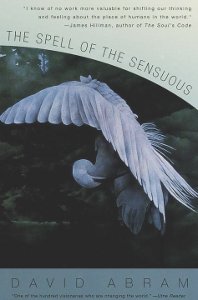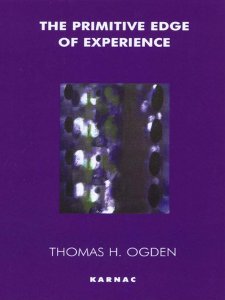
In The Spell of the Sensuous (1997) ecologist and philosopher David Abram examines how our minds have become severed from sensory experience, and – consequently – our bodies disconnected from the natural world.
The blame for our current ecological plight he allocates predominantly to alphabetic writing, which destroyed the link between meaning and its basis in our physical participation in the processes and qualities of the natural world.
When linguistic signs become based on arbitrary vocal sounds (in contrast to pictographic symbols), then: “the larger, more-than-human life-world is no longer a part of the semiotic, no longer a necessary part of the system†(1997: 101). Consequently,
our organic attunement to the local earth is thwarted by our ever-increasing intercourse with our own signs […] Human awareness folds in upon itself, and the senses […] become mere adjuncts of an isolate and abstract mind bent on overcoming an organic reality that now seems disturbingly aloof and arbitrary. (1997: 267)
Specifically, it was the ancient Greeks who led us into this sorry state. “Socrates forced his interlocutors to separate themselves, for the first time, from their own words†(1997: 109). Myths and stories formerly provided a union with nature, which Plato’s writings undermined and destroyed. In an oral culture, a term such as “Justice†always has a context: it is expressed in stories as a specific occurrence, as an event that actually took place. Yet “Socrates attempts to induce a reflection upon the quality as it exists in itself†(1997: 111), and so we arrive – via Plato – at the sense of Justice as a thing-in-itself, an abstract entity with an existence somehow independent from the physical world. There is now scope for belief in a realm of ideas separate from nature, and Abram’s complaint is that we have become increasingly lost in this Platonic invention.
Abram’s book has been influential. His evocation of the role of sensation and perception in human cognition is powerful and compelling. He offers a philosophical foundation for shamanistic and ecological magicks. Yet I am troubled by his demonisation of Platonism, and his privileging of the body and nature above soul and intellect.
If, as Abram suggests, the invention of phonetic writing sealed us within a world of human signs, excluding the other in the body, in non-human species and the natural environment, then our conception of soul or spirit is a harmful, autistic delusion.
However, surely by coincidence, the very next book I read after Abram’s makes a similar but opposite argument. In The Primitive Edge of Experience (2004), psychoanalyst Thomas Ogden writes of a basic mode of human experiencing that he names “the autistic-contiguous positionâ€:
Sequences, symmetries, periodicity, skin-to-skin “molding†are all examples of contiguities that are the ingredients out of which the beginnings of rudimentary self-experience arise. (2004: 32)
The elements of this level of experience, which first appears in early infancy, are perceptual sensations of bodily contact, hardness or softness, being rocked, rhythms of appearances and disappearances, all of which: “have nothing to do with the representation of one’s affective states, either idiographically or fully symbolically. The sensory experience is the infant†(2004: 35).

Yet whereas Ogden concurs with Abram that the use of language or symbolisation detracts from experience at this autistic-contiguous level, in Ogden it lacks the Edenic quality evoked by Abram’s writing. For Ogden, the autistic-contiguous is “preparatory for the creation of symbols†(2004: 59), and to dwell exclusively within it presents a dilemma of becoming “entrapped in sensory experience†(2004: 78). For Abram, the sensory is primary and language is an autistic detraction. For Ogden, sensation attracts the label of “autismâ€, yet without any sense of pathology, because this type of non-reflective experience provides an essential “bounded sensory ‘floor’ […] of experience†(2004: 45), “the beginnings of qualities of who one is†(2004: 54).
For Abram, the turning in upon human signs results in alienation from the body. But for Ogden, the turning in upon sensory experience results in a basic sense of self on top of which further maturational developments may accrue. Both writers are exploring similar territory, but from opposing points of view. Placing these authors beside one another, perhaps we start to see how this “autismâ€, the reflexive turning in upon oneself, is perhaps not by definition detrimental. And perhaps neither is sensation or symbolisation necessarily malign or benign. Increasingly, it may seem that we are labouring beneath a false opposition between the body and spirit.
Abram himself recognises a flaw in his privileging of the sensory and those indigenous means of apprehending the world that are deeply rooted in it. “If our primordial experience is inherently animistic,†he wonders, “how can we ever account for the loss of such animateness from the world around us?†(1997: 90). The argument that x is our primary mode of being, but that x has been forgotten, contains a glaring contradiction that the forgetting of x is evidently more primary than x itself. In that case, perhaps the ecological crisis is not a consequence of the invention of writing so much as the forgetting of nature because our (even more) primary mode of being is, perhaps, forgetfulness. Indeed, for Ogden, the autistic-contiguous is a “position†(2004: 11), a kind of stance or attitude that may be lost, or into which we may fall at any time, if more sophisticated levels of being are placed under stress. Our fundamental mode of being is maybe neither sensory nor cognitive, neither bodily nor spiritual. Perhaps our fundamental mode of being consists in not having a fundamental mode of being.
Enlightenment traditions present themselves as the antidote to habitual forgetfulness. Techniques for realising the absence of a fundamental self rely on cultivating a turning inwards, a kind of intentional autism that contrasts with the reactive type that both Abram and Ogden evoke. Within enlightenment traditions, it does not appear to matter what the objects of that turning inwards might be, whether sensations, thoughts or meritorious actions. The intention is to realise how whatever fills experience is not fundamentally what we are, because it is not invulnerable to forgetting.
Applying this to magickal practice, my view is that magick is wherever we find it. There are body magicks and shamanistic nature magicks. But there are also word and number magicks, and magicks of abstract contemplation. They are not of equal value, but neither is one of them necessarily of greater value than all the rest.
References
Abram, D. (1997) The Spell of the Sensuous: Perception and Language in a More-Than-Human World. New York: Vintage.
Ogden, T.H. (2004) The Primitive Edge of Experience. London: Karnac.
